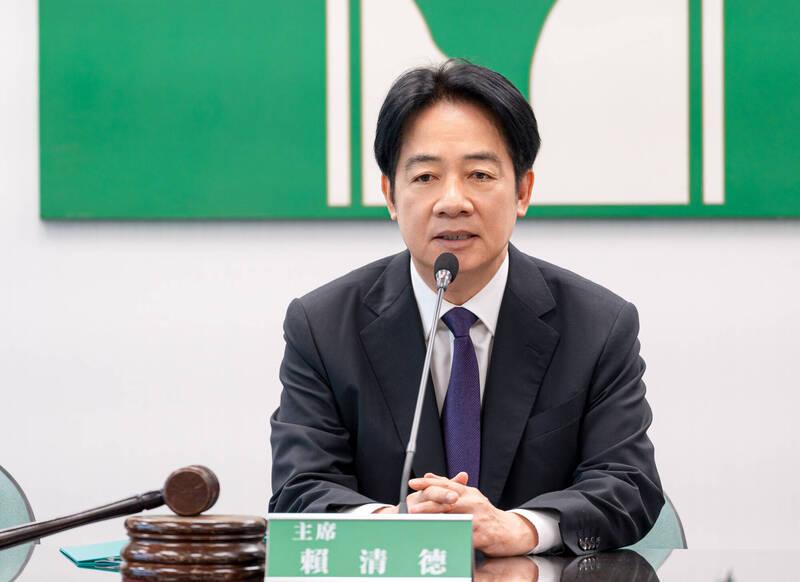President William Lai (賴清德) today said that he would personally accept all criticism of the Democratic Progressive Party’s (DPP) shortcomings, following disappointing results in Saturday’s recall election.
During a meeting of the DPP Central Standing Committee, Lai in his capacity as party chairman apologized to all civic groups and DPP supporters who were involved in the recall effort, and thanked them for their hard work collecting petition signatures through scorching heat and pouring rain.
The recall vote — which saw all 24 Chinese Nationalist Party (KMT) legislators on the ballot retain their offices — followed petitions from civil groups initiated according to the Constitution, he said, adding that the party and public must respectfully accept the nation’s decision.

Photo courtesy of the Democratic Progressive Party
As the ruling party, the DPP would take all public concerns that arose during the recall movement seriously, from the upholding of Constitutional and democratic order, to national security, he said.
Hopefully, movements would in the future involve further dialogue as opposed to confrontation, he added.
Lai acknowledged that Saturday’s result left many feeling disappointed, saying that he also felt regretful.
However, “we must turn this disappointment into bravery, hope and strength, while turning regret into determination to initiate reforms,” he added.
A further seven districts are set to host recall elections on Aug. 23.
Lai said he has instructed the party’s central office and local party officials in the relevant constituencies to stand side-by-side with every citizen and group working toward the next recall effort.
Also this afternoon, Lai formally accepted DPP Secretary-General Lin Yu-chang's (林右昌) resignation, which he tendered on Sunday after the recall defeat.
DPP Deputy Secretary-General Ho Po-wen (何博文) is to temporarily hold the position concurrently with his current role, Lai said.

The Coast Guard Administration (CGA) yesterday said it had deployed patrol vessels to expel a China Coast Guard ship and a Chinese fishing boat near Pratas Island (Dongsha Island, 東沙群島) in the South China Sea. The China Coast Guard vessel was 28 nautical miles (52km) northeast of Pratas at 6:15am on Thursday, approaching the island’s restricted waters, which extend 24 nautical miles from its shoreline, the CGA’s Dongsha-Nansha Branch said in a statement. The Tainan, a 2,000-tonne cutter, was deployed by the CGA to shadow the Chinese ship, which left the area at 2:39pm on Friday, the statement said. At 6:31pm on Friday,

The Chinese People’s Liberation Army Navy’s (PLAN) third aircraft carrier, the Fujian, would pose a steep challenge to Taiwan’s ability to defend itself against a full-scale invasion, a defense expert said yesterday. Institute of National Defense and Security Research analyst Chieh Chung (揭仲) made the comment hours after the PLAN confirmed the carrier recently passed through the Taiwan Strait to conduct “scientific research tests and training missions” in the South China Sea. China has two carriers in operation — the Liaoning and the Shandong — with the Fujian undergoing sea trials. Although the PLAN needs time to train the Fujian’s air wing and

Taiwanese celebrities Hank Chen (陳漢典) and Lulu Huang (黃路梓茵) announced yesterday that they are planning to marry. Huang announced and posted photos of their engagement to her social media pages yesterday morning, joking that the pair were not just doing marketing for a new show, but “really getting married.” “We’ve decided to spend all of our future happy and hilarious moments together,” she wrote. The announcement, which was later confirmed by the talent agency they share, appeared to come as a surprise even to those around them, with veteran TV host Jacky Wu (吳宗憲) saying he was “totally taken aback” by the news. Huang,

The American Institute in Taiwan (AIT) put Taiwan in danger, Ma Ying-jeou Foundation director Hsiao Hsu-tsen (蕭旭岑) said yesterday, hours after the de facto US embassy said that Beijing had misinterpreted World War II-era documents to isolate Taiwan. The AIT’s comments harmed the Republic of China’s (ROC) national interests and contradicted a part of the “six assurances” stipulating that the US would not change its official position on Taiwan’s sovereignty, Hsiao said. The “six assurances,” which were given by then-US president Ronald Reagan to Taiwan in 1982, say that Washington would not set a date for ending arm sales to Taiwan, consult